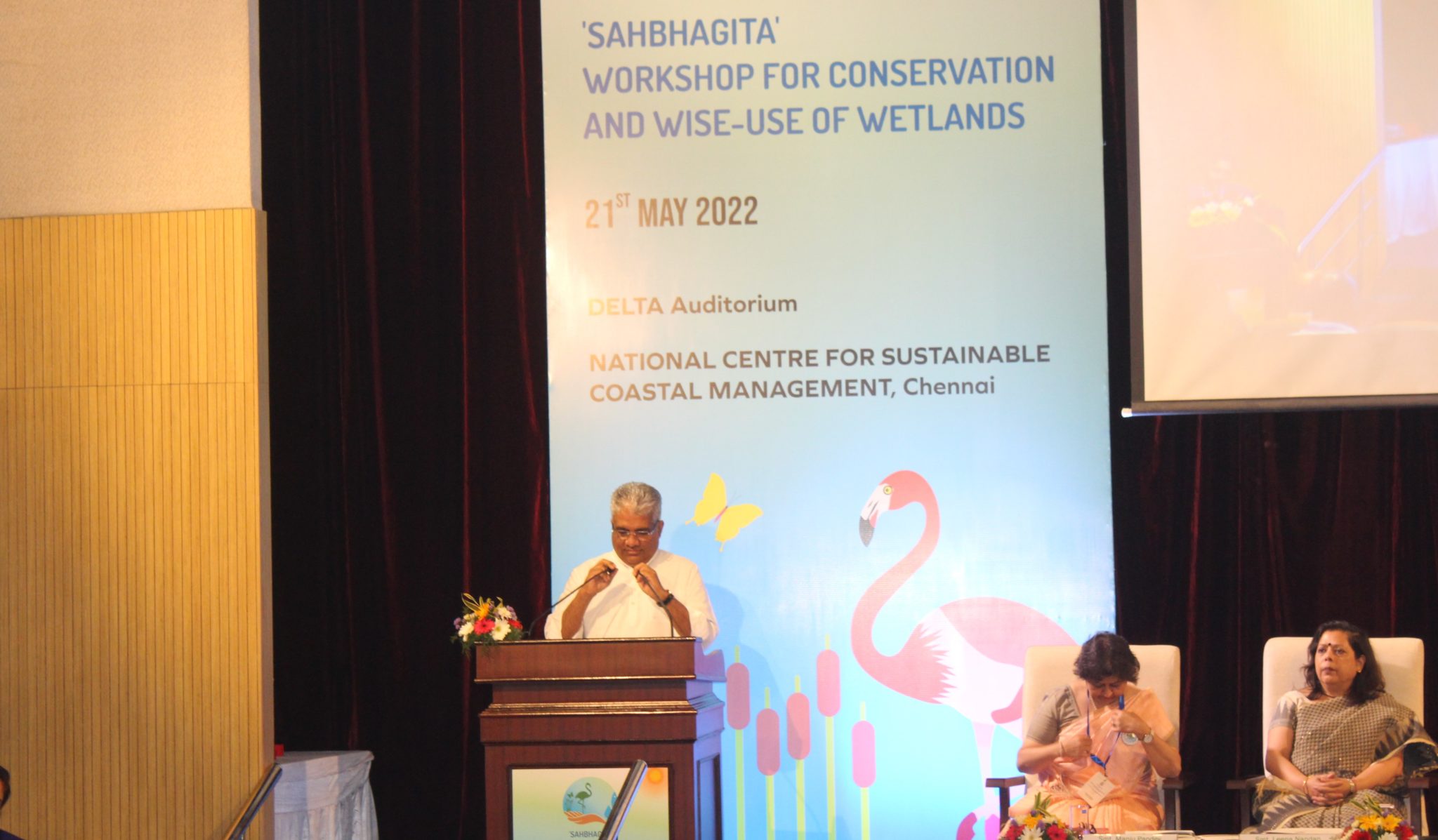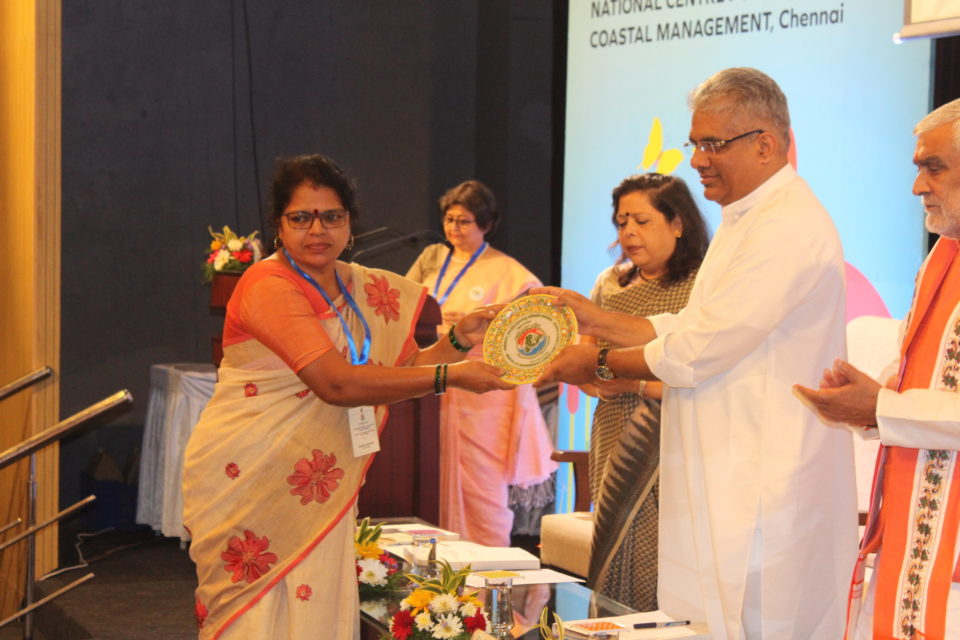
Sahbhagita: National Workshop for Conservation and Wise-Use of Wetlands Convened
-
Private sector performance
-
Wetland values, status and trends
The Ministry of Environment, Forest and Climate Change (MoEFCC) organized a National Workshop for Developing a Roadmap for Participatory Conservation and Wise-Use of Wetlands. Titled ‘Sahbhagita’, the workshop was held on May 21, 2022, at the National Center for Sustainable Coastal Management (NCSCM) in Chennai, Tamil Nadu. The workshop was held under the aegis of the GEF-UNEP-MoEFCC-funded Integrated Management of Wetlands Biodiversity and Ecosystem Services project and attended by 157 participants. These included wetlands managers from 70 wetlands of international and national importance, 24 representatives from State and UT Wetland Authorities, 14 corporates, 13 wetland champions, 5 NGOs, six knowledge partners, three experts from the National Wetlands Committee and four officials from the wetlands division of the Ministry.
The workshop was organised in two sessions. The morning session chaired by Mrs Manju Pandey (Joint Secretary, MoEFCC) included discussions on key elements of the participatory national wetlands conservation and wise use policy. In her opening remarks, Mrs Pandey stated that the time was ripe to broaden interventions in wetlands conservation from being largely regulatory to one that enables a participatory governance and action environment.
Dr Ritesh Kumar (Director, Wetlands International South Asia) presented an overview of the current status of wetlands of national and international significance, building a case for relooking wetlands management from a development convergence perspective while engaging diverse stakeholders groups.
Three parallel round table sessions were held to deliberate upon the three themes namely a) Building convergence with conservation and development plans and programmes and investments at various levels; b) Creating an enabling and participatory governance environment for Sahbhagita; and c) Bridging the science-policy-action divide to support Sahbhagita
The second session, chaired by Hon’ble Union Minister of Environment, Forest and Climate Change, Mr Bhupender Yadav, included presentation of the round table results, and dialogue with the wetlands managers and decision-makers.
Hon’ble Union Minister Mr Bhupender Yadav and Hon’ble Minister of State Mr Ashwini Kumar Choubey felicitated thirteen Wetland champions from across the country with a memento. The Wetland Champions felicitated include Mr. Tambor Lyngdoh from Meghalaya, Ms. Shweta Hule from Maharashtra, Mr. Sangay Lama Sherpa from Sikkim, Mr. Ramveer Tanwar from Uttar Pradesh/National Capital Region, Mr. Meerasa from Tamil Nadu, Mr. Manish Rajankar from Maharashtra, Mr. Kochu Muhammed from Kerala, Ms. Ganga Rajput and Ms. Babita Rajput from Madhya Pradesh, Mr. Bijay Kumar Kabi from Odisha, Mr. Arturo D’Souza from Goa, Ms. Aditi Deodhar from Maharashtra and Mr. Sankar from Tamil Nadu.
A Memorandum of Cooperation between Indian Business and Biodiversity Initiative and the MoEFCC was signed to establish a joint work programme on wetlands. The Memorandum was signed by Mrs. Manju Pandey (Joint Secretary, MoEFCC) and Ms. Seema Arora (Deputy Director-General, CII).
In his address, the Union Minister highlighted the critical role of the wetland ecosystem as kidneys of the landscape and thereby the need for conservation and wise use. He also stressed that wetlands constituted an integral part of India’s cultural heritage and traditions. He mentioned the government’s initiatives to bring wetlands conservation to the fore. Mention was made of Mission Amrit Sarovar, which aimed at developing and rejuvenating 75 water bodies in each district of the country as a part of the celebration of Azadi ka Amrit Mahotsav. The Union Minister underlined the need to balance nature conservation and development at various levels. Hon’ble Minister of State Mr Ashwini Kumar Choubey, in his address, called for urgent scaling up of efforts on wetlands conservation and wise use. He mentioned that wetlands loss and degradation is a pressing developmental challenge today. Concerted actions are therefore required across different ministries and agencies of the government.
Laying stress on the necessity of transition in the approach of wetland governance from regulatory to participatory, Ms. Leena Nandan (Secretary, MoEFCC) reaffirmed according high significance of wetlands conservation by the Ministry and seeking to mainstream their full range of values at all levels of developmental planning and decision-making. Mrs Nandan also stressed that a harmonized understanding of wetlands and their hydrological functions in a landscape is the foundation step.

